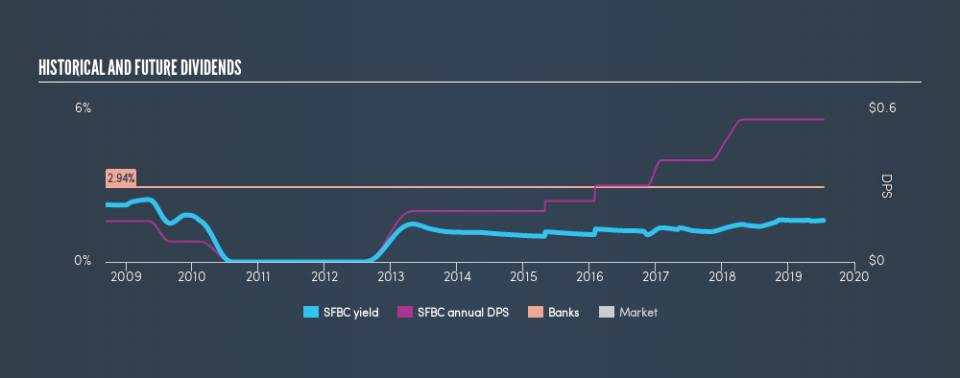Why Dividend Hunters Love Sound Financial Bancorp, Inc. (NASDAQ:SFBC)

Want to participate in a short research study? Help shape the future of investing tools and you could win a $250 gift card!
Could Sound Financial Bancorp, Inc. (NASDAQ:SFBC) be an attractive dividend share to own for the long haul? Investors are often drawn to strong companies with the idea of reinvesting the dividends. Yet sometimes, investors buy a stock for its dividend and lose money because the share price falls by more than they earned in dividend payments.
A 1.6% yield is nothing to get excited about, but investors probably think the long payment history suggests Sound Financial Bancorp has some staying power. There are a few simple ways to reduce the risks of buying Sound Financial Bancorp for its dividend, and we'll go through these below.
Explore this interactive chart for our latest analysis on Sound Financial Bancorp!
Payout ratios
Dividends are usually paid out of company earnings. If a company is paying more than it earns, then the dividend might become unsustainable - hardly an ideal situation. So we need to form a view on if a company's dividend is sustainable, relative to its net profit after tax. Looking at the data, we can see that 20% of Sound Financial Bancorp's profits were paid out as dividends in the last 12 months. With a low payout ratio, it looks like the dividend is comprehensively covered by earnings.
Consider getting our latest analysis on Sound Financial Bancorp's financial position here.
Dividend Volatility
One of the major risks of relying on dividend income, is the potential for a company to struggle financially and cut its dividend. Not only is your income cut, but the value of your investment declines as well - nasty. Sound Financial Bancorp has been paying dividends for a long time, but for the purpose of this analysis, we only examine the past 10 years of payments. This dividend has been unstable, which we define as having fallen by at least 20% one or more times over this time. During the past ten-year period, the first annual payment was US$0.16 in 2009, compared to US$0.56 last year. This works out to be a compound annual growth rate (CAGR) of approximately 13% a year over that time. Sound Financial Bancorp's dividend payments have fluctuated, so it hasn't grown 13% every year, but the CAGR is a useful rule of thumb for approximating the historical growth.
So, its dividends have grown at a rapid rate over this time, but payments have been cut in the past. The stock may still be worth considering as part of a diversified dividend portfolio.
Dividend Growth Potential
With a relatively unstable dividend, it's even more important to see if earnings per share (EPS) are growing. Why take the risk of a dividend getting cut, unless there's a good chance of bigger dividends in future? It's good to see Sound Financial Bancorp has been growing its earnings per share at 13% a year over the past 5 years. Earnings per share are growing at a solid clip, and the payout ratio is low. We think this is an ideal combination in a dividend stock.
Conclusion
Dividend investors should always want to know if a) a company's dividends are affordable, b) if there is a track record of consistent payments, and c) if the dividend is capable of growing. Firstly, we like that Sound Financial Bancorp has a low and conservative payout ratio. Next, earnings growth has been good, but unfortunately the dividend has been cut at least once in the past. Sound Financial Bancorp has a credible record on several fronts, but falls slightly short of our standards for a dividend stock.
See if management have their own wealth at stake, by checking insider shareholdings in Sound Financial Bancorp stock.
We have also put together a list of global stocks with a market capitalisation above $1bn and yielding more 3%.
We aim to bring you long-term focused research analysis driven by fundamental data. Note that our analysis may not factor in the latest price-sensitive company announcements or qualitative material.
If you spot an error that warrants correction, please contact the editor at editorial-team@simplywallst.com. This article by Simply Wall St is general in nature. It does not constitute a recommendation to buy or sell any stock, and does not take account of your objectives, or your financial situation. Simply Wall St has no position in the stocks mentioned. Thank you for reading.

